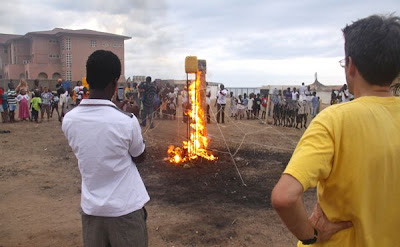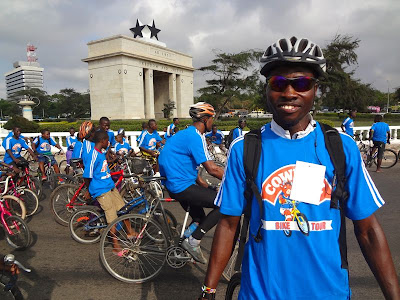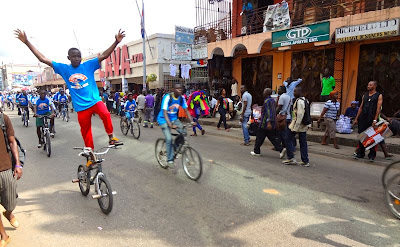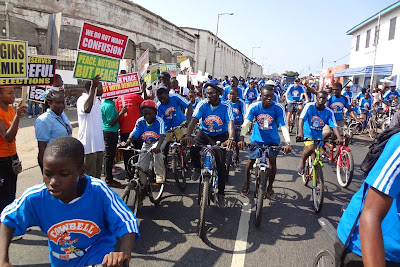Seeking beauty in an urban environment has always something disconcerting; in Accra this means also overcoming the blatant lack of urban planning, the problematic concept of "public space" and the problems of everyday filth and hygiene. To find beauty where it is most hidden is the artist's most daring assignment...
The vocation of the arts is in the desire to expose people to beautiful things, but the arts are selfish: in general we expect the people to come to the arts rather than the arts going to the people. Integrating museum art and street art into one overall event allows to bring the best of both worlds together...
I read Ghanaian author Ayi Kwei Armah's novel The Beautyful Ones Are Not Yet Born back in my twenties when I, naively, thought I might go to Africa on a Fulbright exchange.
Then, Ghana seemed an exotic place - unable to be understood, out of reach. Now I live here.
Six months ago I picked up a copy of the book and started to read it again. Figured I might have a different perspective these days. But my reading got waylaid.
I was brought back to the book last week by a group of artists who are using the novel's title and themes as a springboard for an art exhibit and happening - sharing their own perspectives on Accra life. Anna Kurtycz and Rudek van der Helm of Studio Kurtycz, whose November/December 2011 show Neither Black Nor White I also blogged about, teamed with local artists to put together this group event.
 |
| The performance-burning of one of a local artist's installations. |
While I haven't yet seen the gallery portion of the show hung at the Goethe Institut in Accra, I did get to attend an art affair that opened the companion open-air/installation portion of the show in the tiny urban fishing community of La on the edge of Accra's beachfront.
When I arrived at the event a few musicians and dancers were beginning a procession through the community's winding dirt paths. Along the way they passed artist's photos hung on the concrete or plywood walls of village structures as well as numerous site-specific installations.
The most accessible and engaging of the installations that I saw were Rudek's larger-than-life, block-print-style portraits painted onto clear acrylic sheets and scattered around the community. Done in black with a sparing accent color or two where appropriate, I slowly came to realize these were portraits of La residents.
Looking at a portrait titled "John Wayne," a man came up to me and proudly told me I was regarding a picture of himself. Turns out he is the chief fisherman of the village, and I was standing outside his house; the print was mounted just by his front door.
Apparently the chief fisherman loves Westerns, and so everyone knows him as John Wayne. His portrait carried a boat paddle and a fishing net instead of the obligatory cowboy lasso and six-shooter.
The "moving installation" of artists and La residents wearing "I (Heart) LA" t-shirts was another perfectly whimsical touch. Were the shirts originally 'I Love Los Angeles' tees appropriated for the moment? Were they designed and made to be Ghana-La shirts? I still don't know, but either way they were an invitation to contemplate the vast difference between the Los Angeles metropolis and Ghana's urban beach village of La, as well as a playful comment on the appropriation/appropriateness of tourist kitsch.
Anna and Rudek's careful alliances with Ghanaian artists - and now a Ghanaian community as well - treated audience members on Saturday to a Western-style public-art display integrated into and complementary of the life of a ramshackle developing-country settlement.
 |
Rudek's print-painting (left) of a common Accra sight - a man with his pants half down peeing -
echoed by a human in the distance fastening his pants after some business on the beach. Though an
unhygienic practice, the lack of access to toilets is also a justice issue. |
"It's hard to tell where the art ends and the village begins," said art appreciator and audience member Laura Evans.
I felt that way, too, as I joined two middle-aged local men atop a lopsided pile of concrete blocks to get a better perspective on the crowd, the performers, and the art. I watched local kids kick a dirty soccer ball between contemporary-art-inspired installations that would have been just as at home in the Tate Modern in London as on this hardscrabble dirt field next to the tight clusters of village huts. I watched a small group of women stoking their open-air kitchen fires, stirring large metal pots of soup, tending to their children - as they always do - listening to the live music and regarding the art-audience-outsiders with appreciation and amusement.
And I felt that, at least for this day in the dirty urban-beach town of La, ordinary life was an artistic enterprise and art became a reflection - perhaps even an illumination - of both the mundanity and the sanctity of the everyday.
Now I'd better get back to finishing that Beautyful Ones book.
 |
A Zoomlion (refuse collection) worker's portrait mounted by the dumpsters
where she sorts her garbage, just across a dirt field from her hamlet of La. |



























